

R U Ready 2 Trust'em?: Michelle Luhtala at TEDxWestportLibrary. CARTOON-SULLIVAN01131.png (700×528) Www.pewinternet.org/files/old-media/Files/Reports/2013/PIP_TeensandTechnology2013.pdf. Younger Americans’ Library Habits and Expectations. Released: June 25, 2013 By Kathryn Zickuhr, Lee Rainie and Kristen Purcell Younger Americans—those ages 16-29—exhibit a fascinating mix of habits and preferences when it comes to reading, libraries, and technology.
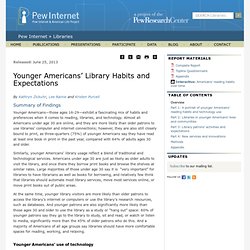
Almost all Americans under age 30 are online, and they are more likely than older patrons to use libraries’ computer and internet connections; however, they are also still closely bound to print, as three-quarters (75%) of younger Americans say they have read at least one book in print in the past year, compared with 64% of adults ages 30 and older. Similarly, younger Americans’ library usage reflect a blend of traditional and technological services. Americans under age 30 are just as likely as older adults to visit the library, and once there they borrow print books and browse the shelves at similar rates. Younger Americans’ use of technology. Kids Can't Focus These Days. Then Again, Neither Can I. As a school librarian, I wind up reading all sorts of damning reports on students' lack of reading skills.
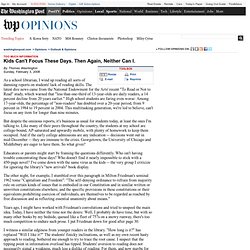
The latest dire news came from the National Endowment for the Arts' recent "To Read or Not to Read" study, which warned that "less than one-third of 13-year-olds are daily readers, a 14 percent decline from 20 years earlier. " High school students are faring even worse: Among 17-year-olds, the percentage of "non-readers" has doubled over a 20-year period, from 9 percent in 1984 to 19 percent in 2004. This multitasking generation, we're led to believe, can't focus on any item for longer than nine minutes. But despite the ominous reports, it's business as usual for students today, at least the ones I'm talking to. Like many of their peers throughout the country, the students at my school are college-bound, AP-saturated and upwardly mobile, with plenty of homework to keep them occupied.
Educators or parents might start by framing the questions differently. Tvwashington@gmail.com. Kids Can't Focus These Days. Then Again, Neither Can I. Is Google Making Us Stupid? - Nicholas Carr. Illustration by Guy Billout "Dave, stop.

Serious reading takes a hit from online scanning and skimming, researchers say. Claire Handscombe has a commitment problem online.
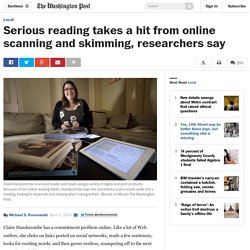
Like a lot of Web surfers, she clicks on links posted on social networks, reads a few sentences, looks for exciting words, and then grows restless, scampering off to the next page she probably won’t commit to. “I give it a few seconds — not even minutes — and then I’m moving again,” says Handscombe, a 35-year-old graduate student in creative writing at American University. But it’s not just online anymore. She finds herself behaving the same way with a novel. “It’s like your eyes are passing over the words but you’re not taking in what they say,” she confessed. To cognitive neuroscientists, Handscombe’s experience is the subject of great fascination and growing alarm. “I worry that the superficial way we read during the day is affecting us when we have to read with more in-depth processing,” said Maryanne Wolf, a Tufts University cognitive neuroscientist and the author of “Proust and the Squid: The Story and Science of the Reading Brain.”
Age of Distraction: Why It’s Crucial for Students to Learn to Focus. Digital classroom tools like computers, tablets and smartphones offer exciting opportunities to deepen learning through creativity, collaboration and connection, but those very devices can also be distracting to students.
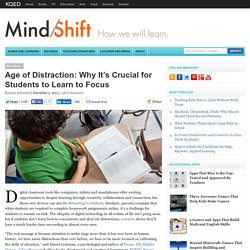
Similarly, parents complain that when students are required to complete homework assignments online, it’s a challenge for students to remain on task. The ubiquity of digital technology in all realms of life isn’t going away, but if students don’t learn how to concentrate and shut out distractions, research shows they’ll have a much harder time succeeding in almost every area. “The real message is because attention is under siege more than it has ever been in human history, we have more distractions than ever before, we have to be more focused on cultivating the skills of attention,” said Daniel Goleman, a psychologist and author of Focus: The Hidden Driver of Excellence and other books about social and emotional learning on KQED’s Forum program. Focus: The Hidden Driver of Excellence. Teens feeling stressed, and many not managing it well. Teens across the USA are feeling high levels of stress that they say negatively affect every aspect of their lives, a new national survey suggests.
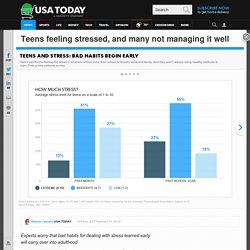
More than a quarter (27%) say they experience "extreme stress" during the school year, vs. 13% in the summer. And 34% expect stress to increase in the coming year. Stressors range from school to friends, work and family. And teens aren't always using healthy methods to cope, finds the latest Stress in America survey from the Washington, D.C. -based American Psychological Association. Here's What You Need To Know About Millennials. Sb66-12102-Five-Millennial-Myths.pdf. Www.strategy-business.com/media/file/sb66-12102-Five-Millennial-Myths.pdf.
5 Myths About Millennial Consumers. Five myths about millennials. Parents report giving their 18-to-29-year-olds more financial support than they remember receiving in their 20s, according to a poll conducted by Clark University.
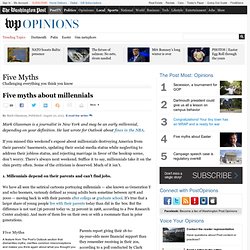
But tuition and the cost of living are far higher now. The rise of the unpaid internship hasn’t helped, either. Young job-seekers are at a disadvantage in today’s economy, but only the youngest millennials are really having a tough time.